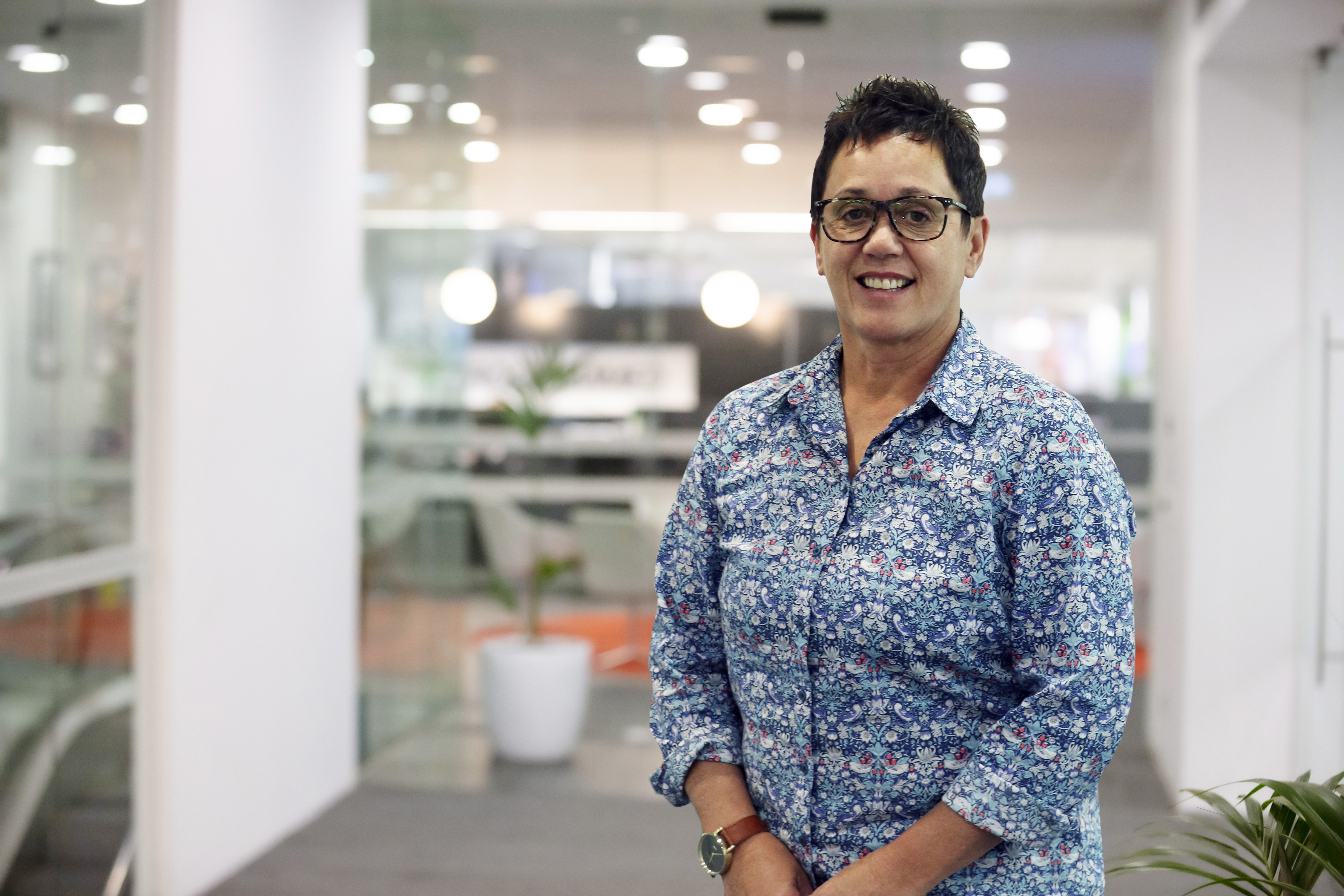Career Profile with Karen Stuart

As we continue to celebrate the many inspirational women in our business we caught up with Karen Stuart, Contract Executive from Programmed Facility Management to chat about her life, her diverse experiences and how she started off her career in trades. If you would prefer to watch our interview with Karen, you can do so via the below link:
Tell us about your background. Where did you start your working life, and what inspired you to pursue a career in trades?
Tell us about your background. Where did you start your working life, and what inspired you to pursue a career in trades? When I was very young at school, I always wanted to be one of two things, a carpenter because I had influences around me from friends and relatives that were in the building game, and the other one was to be a police officer.
Unfortunately, being female, I didn’t and couldn’t entertain the idea of being a carpenter as it just was not a thing that was made available to women or girls of any age and to be a police officer, I needed to be back then quite a bit taller than I am, so I missed out on both of them. I ended up, by pure chance, joining the prison service.
I did that for a number of years and then decided that I wanted to move to Queensland to be with family. Whilst I was there, I saw an advertisement for apprentices with Queensland Master Builders and by the Monday afternoon following, I had an apprenticeship. I managed to finish my apprenticeship earlier than the required four years and then went on to supervise building lots of social housing complexes and stuff like that.
A few years after, an acquaintance called and asked if I was interested in coming back to the prison system, which I did. I went on to complete some university studies in construction management and the rest is history.
What was the culture like when you started working in the trade industry?
Well, I think I was a test case to having a woman on the job site. People were very conscious about, do I swear? Do I not swear? What toilets does she use? It was just as difficult for the men that were on site that weren’t used to now having to accommodate for a female.
I can remember clearly that while everybody was friendly, I had to prove myself probably five times more than a bloke ever did. I had to be quicker. I had to be faster. I had to be more accurate. I had to really push myself. To prove myself and that was unfair, but it was the way it was at the time. And certainly you wouldn’t tolerate that now.
How have you overcome adversity, both with colleagues and clients?
I remember I would turn up to a site to do some work, and the blokes would look at you and go, she’s going to pitch my roof or, she’s going to stand that frame, or she’s going to lift that.
It was just a matter of holding your own. I think my prison up bringing where my career started definitely assisted me back then where I was able to kind of hold my own conversation and push back on some of these things that were important to push back on.
You just had to show people that I can lift that 60 kilo rafter. That’s not a drama; I can build that I can stand that wall up, I can climb that roof, I can pitch that rafter. Just do your job and let the work speak for itself and eventually people came around.
I made some incredibly good friends out of people that weren’t allies when I started that believed women belonged in the kitchen and pregnant and not on the tools.
I think it was just about perseverance. It was about showing people through your actions, what you were capable of doing, and that certainly opened the doors.
Can you tell us what your role now as a Contract Executive does with Facility Management?
My role is to basically look after particular sectors and contract manage those sectors as well as look at expanding Programmed’s portfolio.
We are focused on really driving and delivering and expanding on community and social housing, which justice sits neatly on the side. If you know about justice, we’re talking about disadvantaged people; we’re talking about a whole range of different clientele that sort of sit within community and justice housing.
We’re talking about domestic violence victims through to women’s housing groups which obviously correlates with prisons. Everything Programmed talked about, the people that I met informally through the interview process, I thought this is something I want to be part of.
I’ve been in the role for 18 months now. I’ve been able to use my justice experience, my building background and I’ve been able to use my exposure to community and social housing and social inclusion.
When we talk about social inclusion within Programmed, that’s about diversity, that’s about disabilities. That’s about LGBT+I; it’s about everything and working in the prison system and justice for so long I think it’s a good fit.
The theme for International Women’s Day this year is ’Choose to Challenge’. What does this mean To you?
For me, it means that I need to understand my own values. I need to understand the values of others, and I need to understand the organisational values.
I’m very much about inclusiveness regardless of race, gender, sexual orientation. It doesn’t really matter to me and I make sure I surround myself with like minded people.
I think people need to be true to themselves, but for those people that aren’t with the norms now that are our society, they need to wake up and smell the roses, because to ostracise somebody for being different, whatever that be is just not accepted.
We’ll speak up even if they don’t. We all have a role to play. When they can’t fi nd the courage themselves to do it, that’s what we need to do. We need to encourage people that we can support them to be themselves.’
Women currently represent only two per cent of the Australian trades workforce. What do you think organisations can do more of, to ensure true diversity, inclusiveness and equity can be achieved?
I’m surprised about that actually, because it feels like we we’re at two per cent 20 years ago. Well, governments have pushes every now and again, so people can lobby government for not just funding, but by putting messages out there and creating organisations that support women in these non-traditional type areas or support people that are. There are lots of organisations out there.
Whereas I go, well what could Programmed do? Programmed already do a lot of stuff internally There’s no doubt about that. They support their staff and, there’s all types of working groups to. help and improve the acceptance and diversity in the workplace.
It’s no good just knowing that we’re Programmed and advertising an electrician’s job. What we need to do is go out into the community and actually educate people, but predominantly females, that it’s okay to come to work with us as tradie. We will give you a job, we’ll give you what you need to become an electrician and in this day and age, there’s lots of support around you.
What advice would you give other females in trade who are starting or wanting to enhance their careers? I think it’s two different things there.
So, starting your career in a trade. Make sure it’s what you want. As modern as things have become and as much policy and legislation that’s being put around to protect women, there is still that element of bias.
In the community, you need to have resilience to be able to deal with that, make sure it’s what you want, kick on with it and be confident that people and organisations like Programmed are going to support you.
There is nothing better for me than being able to build something and stand back and go; I did that. The rewards are inevitable, and there is always room to grow.
I was supervising building sites within 12 months of finishing my apprenticeship.
It’s like everything. If you apply yourself and people can see that you’re good at what you do, you don’t have to put your hand up, they’ll come to you. Let your work, do the talking for you, basically. It doesn’t mean you have to be the chippy that turns up on-site and constructs the frame for the house every day, because when you look outside of that and open your eye sup, there’s so many more avenues that you can use your transferable skill sets to get into leadership type roles.
Also, look for a good mentor. I found through my career, I really looked for good mentors. I set goals pretty early in my career, and then I had to work out how do I achieve that? What do I need to do to get there? Not only from the working side of things, but also what do I need to be a leader and what kind of leader am I going to be?
Quite often, people pick a mentor that is probably not a really good leader or who don’t have people skills. I remember one leader saying to me one day, Karen, if you want to be a good leader, you get more bees with honey.
So I’m like, okay, more bees with honey. That means I have to be better at what I do. I have to be kinder at what I do. I can be assertive if I need to be, but I still need to do that with kindness, because that’s what he means. You’ll get more people that want to follow you and work with you. So, I think, get a really good mentor around you throughout your career. Don’t just think that your direct boss is that mentor. It may not be that person; it may be somebody on the peripheral for you, may be somebody outside the organisation, that you work with.
Those few things I think is important for somebody starting out in a career of any description.

